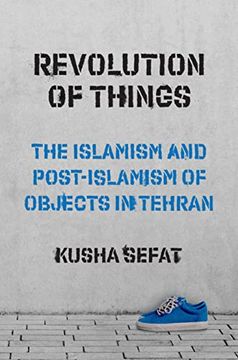Compartir
Revolution of Things: The Islamism and Post-Islamism of Objects in Tehran (Princeton Studies in Cultural Sociology, 22) (en Inglés)
Kusha Sefat
(Autor)
·
Princeton University Press
· Tapa Dura
Revolution of Things: The Islamism and Post-Islamism of Objects in Tehran (Princeton Studies in Cultural Sociology, 22) (en Inglés) - Sefat, Kusha
$ 419.463
$ 635.549
Ahorras: $ 216.087
Elige la lista en la que quieres agregar tu producto o crea una nueva lista
✓ Producto agregado correctamente a la lista de deseos.
Ir a Mis Listas
Origen: Reino Unido
(Costos de importación incluídos en el precio)
Se enviará desde nuestra bodega entre el
Viernes 17 de Mayo y el
Jueves 23 de Mayo.
Lo recibirás en cualquier lugar de Colombia entre 1 y 5 días hábiles luego del envío.
Reseña del libro "Revolution of Things: The Islamism and Post-Islamism of Objects in Tehran (Princeton Studies in Cultural Sociology, 22) (en Inglés)"
An exploration of the ways that shifting relations between materiality and language bring about different forms of politics in Tehran In Revolution of Things, Kusha Sefat traces a dynamism between materiality and language that sheds light on how the merger of the two permeates politics. To show how shifting relations between things and terms form the grounds for different modes of action, Sefat reconstructs the political history of postrevolutionary Iran at the intersection of everyday objects and words. Just as Islamism fashioned its own objects in Tehran during the 1980s, he explains, tyrannical objects generated a distinct form of Islamism by means of their material properties; everyday things from walls to shoes to foods were active political players that helped consolidate the Islamic Republic. Moreover, President Rafsanjani's "liberalization" in the 1990s was based not merely on state policies and post-Islamist ideologies but also on the unlikely things--including consumer products from the West--that engendered and sustained "liberalism" in Tehran. Sefat shows how provincial vocabularies transformed into Islamist and post-Islamist discourses through the circulation of international objects. The globalization of objects, he argues, was constitutive of the different forms that politics took in Tehran, with each constellation affording and foreclosing distinct modes of agency. Sefat's intention is not to alter historical facts about the Islamic Republic but to show how we can rethink the matter of those facts. By bringing the recent "material turn" into conversation with the canons of structural analysis, poststructuralist theory, sociolinguistics, and Middle East studies, Sefat offers a unique perspective on Iran's revolution and its aftermath.
- 0% (0)
- 0% (0)
- 0% (0)
- 0% (0)
- 0% (0)
Todos los libros de nuestro catálogo son Originales.
El libro está escrito en Inglés.
La encuadernación de esta edición es Tapa Dura.
✓ Producto agregado correctamente al carro, Ir a Pagar.

